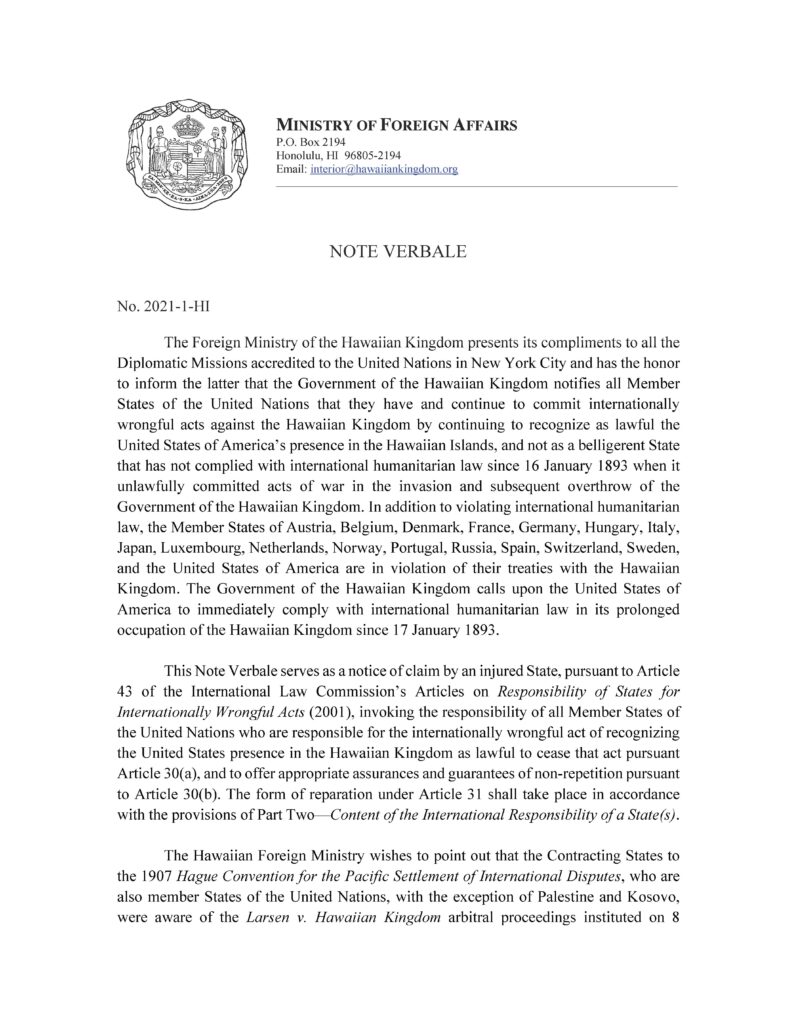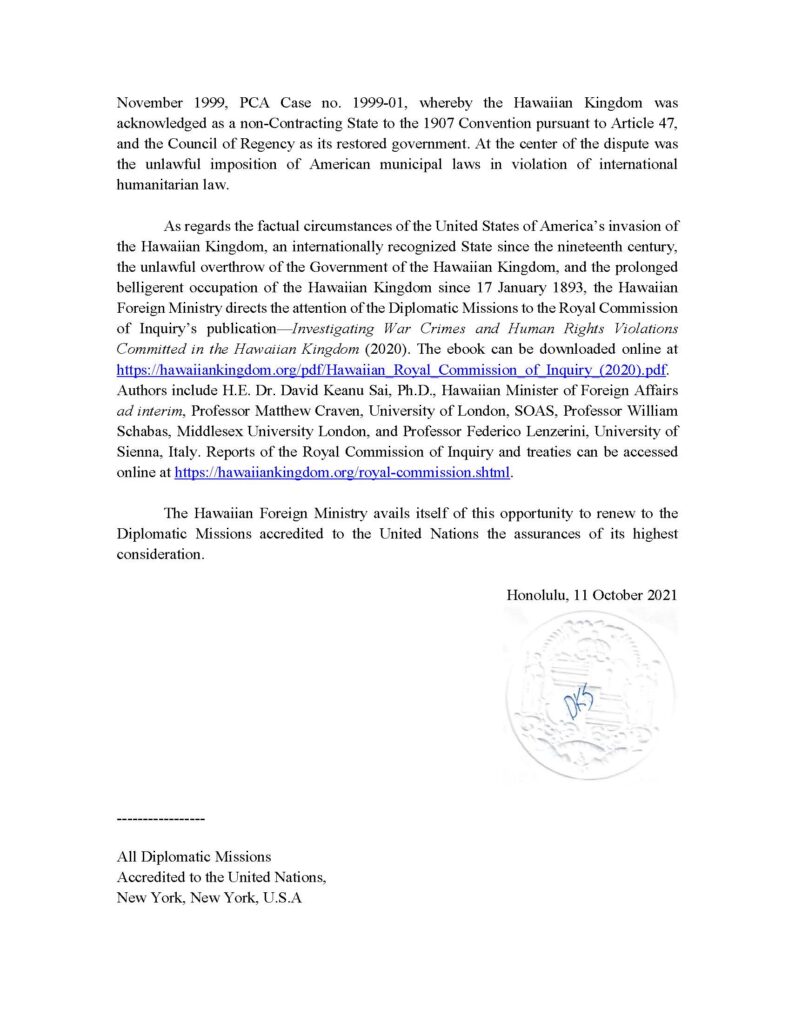According to the Articles of State Responsibility for Internationally Wrongful Acts, enforcement of international law must be triggered by the injured State, which in this case is the Hawaiian Kingdom, through its restored government, the Council of Regency. But prior to the triggering State responsibility for an internationally wrongful act or acts, it must be clear as to what is the internationally wrongful act or acts committed against an injured State.
As a sovereign and independent State, the Hawaiian Kingdom possessed certain fundamental rights under international law. The principal corollaries of sovereign and independent States are: first, exclusive jurisdiction over its territory and the population residing there; second, the duty of non-intervention in the territory of exclusive jurisdiction of other States; and third, the obligations arising from customary international law and treaties by contracting States.
These rules are regarded at the highest level of international law and are called jus cogens or peremptory norms. A peremptory norm or rule is one that cannot be downplayed or derogated. To downplay these principles would undermine the very existence of international law and the international order of States.
When the United States invaded the Hawaiian Kingdom with U.S. troops on January 16, 1893, under the false flag of protecting American lives and property, it violated the duty of non-intervention. As a result of the unlawful overthrow of the Hawaiian Kingdom government the following day on January 17th, it violated the exclusive jurisdiction of the Hawaiian government over its territory and its resident population by supplanting an American proxy called the provisional government.
It wasn’t until five years later that the United States Congress enacted an internal law purporting to have annexed a foreign State on July 7, 1898. Two years later, the Congress enacted another internal law changing the name of their insurgency they installed to be called the Territory of Hawai‘i. And in 1959, the Congress changed the name of the Territory of Hawai‘i to the State of Hawai‘i.
When the United States unlawfully overthrew the government of the Hawaiian Kingdom, customary international law at the time obligated the United States to temporarily administer the laws of the Hawaiian Kingdom as an occupied State. The customary international law of occupation was later codified under the 1907 Hague Regulations and the 1949 Fourth Geneva Conventions, both of which the United States and signed and ratified. This failure to administer Hawaiian Kingdom law violated the third principle of obligations arising from customary international law and treaties.
Under international law, there are only three ways in which a State can acquire additional territory. These mechanisms include: cession from other States by a treaty (the Louisiana Purchase by the United States from France in 1803); by the physical occupation of territory that is terra nullius (Latin: “land belonging to no one”), which is land not under the sovereignty or control of any other State; or by prescription, where a State acquires territory from another State through a continued period of uncontested sovereignty.
In the federal lawsuit, Hawaiian Kingdom v. Biden, the United States asserts that it is the legitimate sovereign over the Hawaiian Islands because it “annexed Hawaii in 1898, and Hawaii entered into the union as a state in 1959.” The United States made no reference to a treaty of cession or even a claim by prescription. Instead, it is relying on its internal law as a mechanism for acquiring foreign territory and imposing American law through its creation called the State of Hawai‘i.
As the Permanent Court of International Justice, in The Lotus Case, stated in 1927, “the first and foremost restriction imposed by international law upon a State is that—failing the existence of a permissive rule to the contrary—it may not exercise its power in any form in the territory of another State. In this sense jurisdiction is certainly territorial; it cannot be exercised by a State outside of its territory except by virtue of a permissive rule derived from international custom or from a convention.” Congressional laws are not “a permissive rule derived from international custom or from a convention.”
The significance of this statement is legally profound because the United States explicitly admitted, in a court of law, that it is committing internationally wrongful acts that has led to the commission of war crimes and human rights violations as pointed out in the Amended Complaint. A State cannot rely on internationally wrongful acts as a defense for the violation of international laws. This reasoning is absurd and synonymous with an individual on trial for theft of a car admits to stealing the car as a defense for the theft.
On October 11, 2021, the Council of Regency, by its Ministry of Foreign Affairs, sent a note verbale to all of the embassies accredited to the United Nations in New York City. It stated, “This Note Verbale serves as a notice of claim by an injured State, pursuant to Article 43 of the International Law Commission’s Articles on Responsibility of States for Internationally Wrongful Acts (2001), invoking the responsibility of all Member States of the United Nations who are responsible for the internationally wrongful act of recognizing the United States presence in the Hawaiian Kingdom as lawful to cease that act pursuant Article 30(a), and to offer appropriate assurances and guarantees of non-repetition pursuant to Article 30(b). The form of reparation under Article 31 shall take place in accordance with the provisions of Part Two—Content of the International Responsibility of a State(s).”


The joint letter by the International Association of Democratic Lawyers (IADL) and the American Association of Jurists—Asociación Americana de Juristas (AAJ), sent to all the Embassies accredited to the United Nations in New York City and in Geneva on February 16, 2022, reinforces the Hawaiian Ministry of Foreign Affairs’ note verbale.

Who implements compliance to right the wrong.
Aloha Madonna,
I am no authority on the subject so this is my unqualified opinion.
The United States (as the criminal state) has a moral and legal obligation to voluntarily comply to make right the wrongs they caused. Most understand how arrogant the United States is so voluntary compliance is unlikely. Failing voluntary compliance by the criminal state, all United Nations Member States are obligated to insure compliance through lawful means. The reading material and links shared by the Council of Regency are worth your time to read. Reading will help you understand.
Paka
Mahalo, Saac.
E Kala Mai. Isaac. That was an auto correct
Mahalo AHKG for answering my question in the previous article regarding the Notice of claim. Had a hunch you would have had it covered but had to ask since I thought it would also have to be addressed through the U.S. State Department. Thanks for pointing out the note verbal.